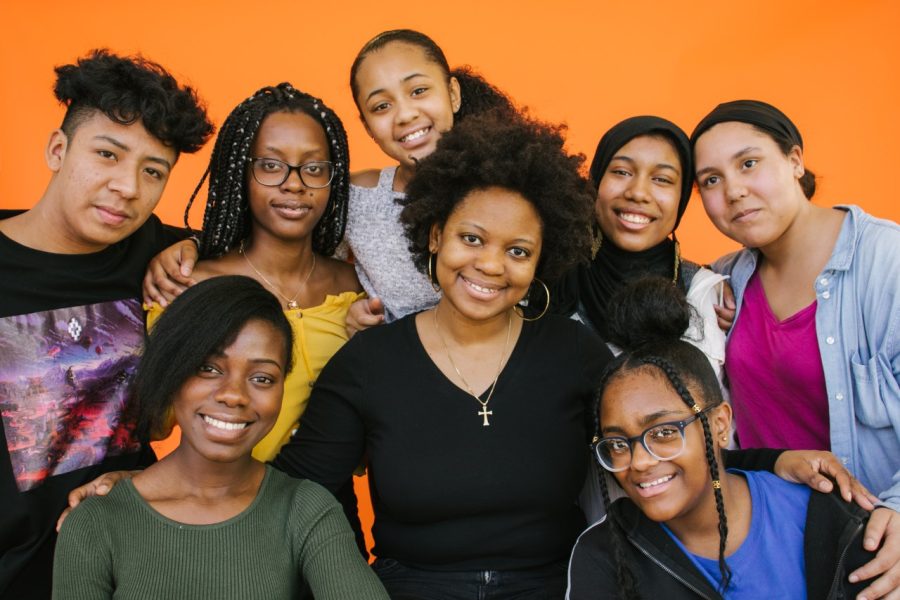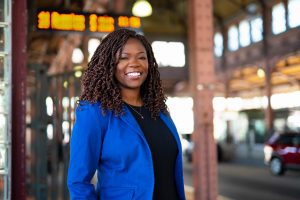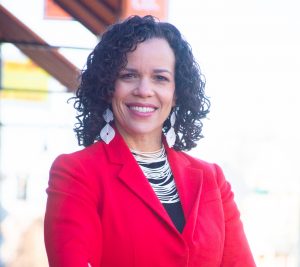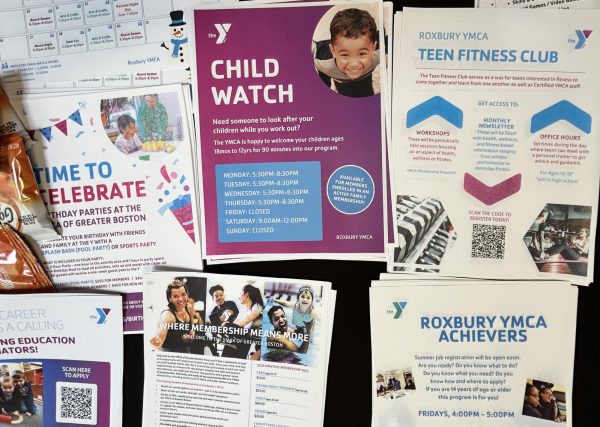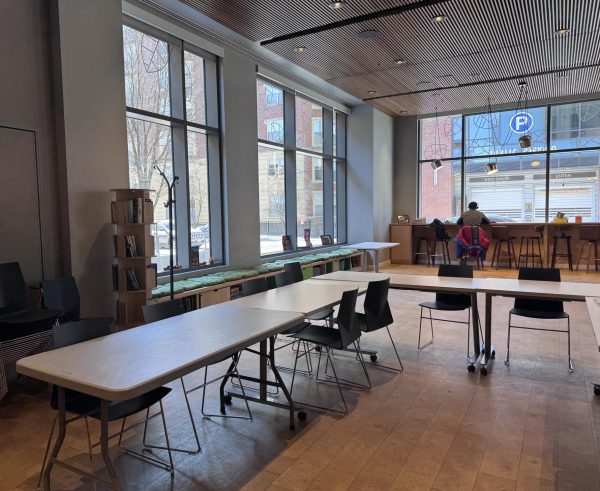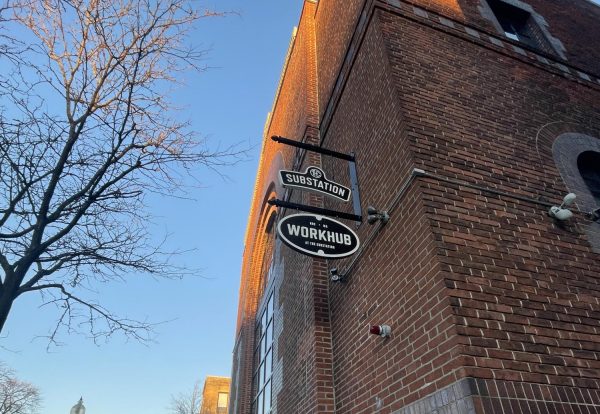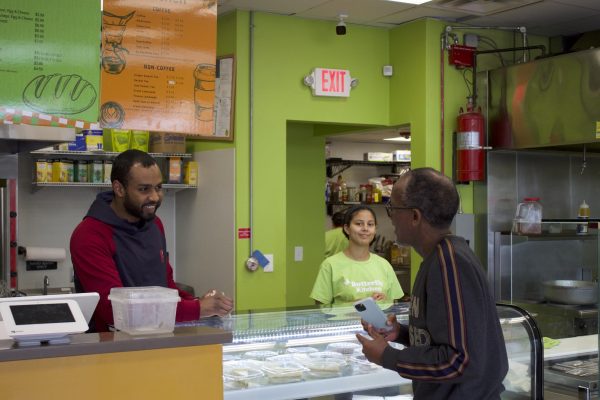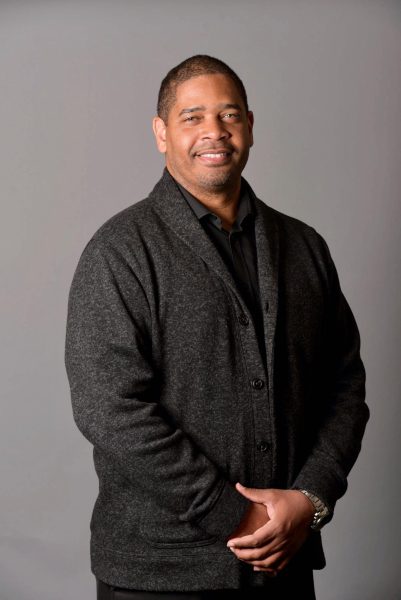Changemaker: 826 Boston empowers students through writing programs
Photo: Katytirika Photography
Nakia Hill with the Writers’ Room, Youth Literary Advisory Board
In 2007 the late Boston Mayor Menino cut a bright red ribbon in front of the Greater Boston Bigfoot Research Institute, giving a home to an organization that works to amplify and empower the voices of Boston’s youth — 826 Boston.
826 Boston is a nonprofit that provides free tutoring, writing and publishing services for BPS K-12 students while giving students the space to share stories, amplify voices and become leaders both in and out of the classroom.
The organization offers a variety of programs, including afterschool tutoring, in-school writers’ rooms, college essay assistance, help for English learners, creative writing workshops, field trips and in-depth publishing projects. The organization serves over 4,500 students and forms supportive partnerships with about 150 teachers annually. A vast network of over 2,500 volunteers from all around Boston contributes their time and talent to each trailblazing program offered.
On Jan. 27th, 826 Boston released its new book, “Lift Ev’ry Voice: Narrative and Poems on Manhood.” Through a series of essays, spoken-word pieces and poems – Becoming A Man students (BAM) and mentors in Jeremiah E. Burke’s Writers’ Room explore what it’s like to be a young man of color today.
The Scope spoke to Nakia Hill, the Youth Writing Program, Innovation, and Partnerships director at 826 Boston, to learn more about the organization. Hill is also the founder of Girls, Write!, a creative writing and publishing program for girls of color in Boston, and developed the Boston Women in the Workplace survey to amplify the voices of women of color in the workplace. Parts of this interview have been edited for length and clarity.
How would you describe 826 Boston in three words?
Whimsical, imaginative and student-focused.
You say 826 Boston is student-focused. Can you elaborate on how 826 Boston centers itself around students’ voices?
Everything that we do is for students. Uplifting their voice, empowering them, paying them, giving them leadership opportunities, etc. Our students already come in with just like their own gifts, their self-assurance. And it’s just important just to support that. Support who they are as individuals. That’s really important.
What do you do in your position as the director of Youth Writing Program, Innovation, and Partnerships at 826 Boston?
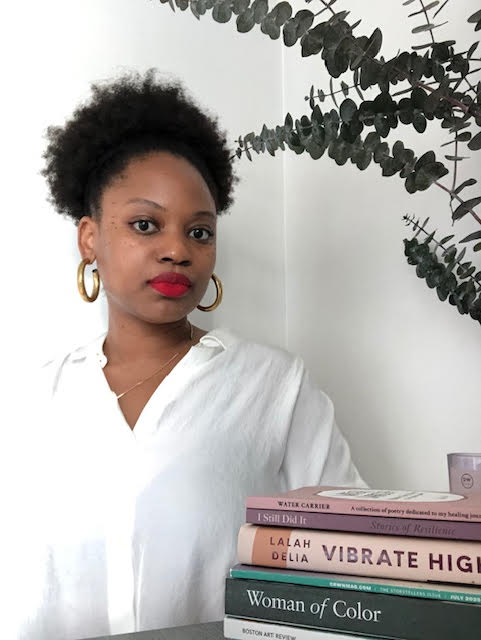
My role is directing our six Writers’ Room programs [in six] Boston Public Schools. I also direct our Youth Literary Advisory Board, our youth leadership program. It’s in the third year right now. And that’s also just a space where students are actually employees of 826 Boston. And so they work, produce a book, produce a podcast and participate in a lot of civic engagement. I’m currently launching our first alumni program network.
How did you start to get involved in 826 Boston?
I have been here for more than seven years… it’ll be eight years in September. I started as a program coordinator, launching our first satellite afterschool program, which was housed at Grove Hall in Boston Public Library. The following year, I transitioned into a management role, launching our second Writers’ Room. The next year, I became a Writers’ Room manager, managing three rooms, and the expansion happened as the years progressed. I’ve been a huge part of the expansion from one room to six rooms alongside 826 Boston team members.
How does the Writers’ Room work to empower Boston Public School’s students?
It really helps us deepen the impact in schools because we’re open four days out of the week. We are right in the school buildings so that teachers can bring their full classes into the rooms, or we can go in the class to support them. We can work with them in small groups, publish books and have binding machines in all of our rooms… and it’s just there for a long period of time, four days out of the week, providing that support. We are right in the building where teachers and students can access us.
Some students, not all, but some have different relationships with writing. It can be very rigorous and intimidating. Writing is a very intimate part of yourself that you’re sharing. Also, if you are working on a piece for your school, you know you will get graded, which is very overwhelming. The Writers’ Room is transformative [because] we really help change students’ relationship with writing, so they understand that writing can be collaborative. Writing is a process. You have the first draft, and then you have to revise it, then you have a second and final draft … There’s going to be a tutor there to support you, to strengthen your writing, or to tell you, ‘This is amazing.’ It’s really encouraging. So with [students] working with the Writers’ Room, they can take that experience into real life and the classroom, and hopefully, be a little easier on themselves and understand that writing is a process, and you write every day… The more you write, the stronger the skill becomes. You keep working on it, and the Writers’ Room team is here to support you.
What have you learned from the students you’ve worked with, and how have they inspired you?
The students inspire me every day. Some of them are fearless. They really know what they want, even as they are grappling, growing, and trying to understand who they are as individuals. Our Youth Literary Advisory Board is one program where students select the theme and weigh in on which designers, illustrators and writing prompts — that’s fully led by students and student-driven. And as adults, we provide guidance and coaching, like ‘This is how much it costs,’ ‘Here’s the budget’ … This is why you need a timeline … a deadline … just to give them that structure. And you just model that for them and then start to get it into it themselves. And you know, if they forget something, you’re there to support them.
The one thing that I’ve learned from students is that they know what’s best for them, not to make assumptions based on who we are as adults, and just really trust them. Because they know who they are, they’re discovering who they are, and like sometimes they can have just better ideas and adults. So not being afraid to let them lead. Let them show you what they are made of and when they need the support, step in and when they get it … step back.
So that’s what I’ve learned most from students and what inspires me is how clear they are about their self-identity, which was the theme for their last book, “How We May Appear,” for YLAB.
I would love to know more about the most recent book released, “Lift Ev’ry Voice,” Could you tell me more about the students’ experience in the Writers’ Room at Jeremiah E. Burke High School in coming together to write this book?
We always dreamed at 826 Boston to collaborate with the Becoming a Man (BAM) Foundation – an organization that really focuses on the social and emotional development qualities of people of color.
The book’s theme is really about uplifting and empowering Black and boys of color’s voices. So the book features pieces, essays, artwork created by students on the editorial board … and [submissions] were open to Black men, men of color in the city. Students on the editorial board decided which pieces would go into the book and were also paid … I was really behind the scene. It was really important that if we were going to uplift Black and boys of color, they’d lead and be at the forefront.
When the students met for the editorial board every week, they met for about six to eight weeks; Durane West led it. He was the teaching artist, so he walked the students through, met virtually, did the curriculum and encouraged the students to write and peer edit and make a real connection. The book is out, and it’s selling. And it’s really beautiful. It’s their stories in their most authentic voice.
In general, if students expressed interest in writing a piece they were interested in publishing through 826 Boston, what would that process look like?
If we’re working on a young author’s book project, we sometimes work with a specific school. The Youth Literary Advisory Board last year was submission-based. As long as they were residents of Boston, students could submit, and the board would select which pieces go into books. We have literary magazines that are produced in our high schools. Also, we do them in our K-8 schools. We publish smaller books – as I mentioned earlier, we have binding machines in our Writers’ Rooms and a publishing programs department. The team will design the cover in-house, send it to a printer, and literally, the students are binding them in the Writers’ Room. So yes, students can get their work published anyway. Mainly, they just have to be affiliated with one of our programs unless you have an open call for submission and publishing books.

